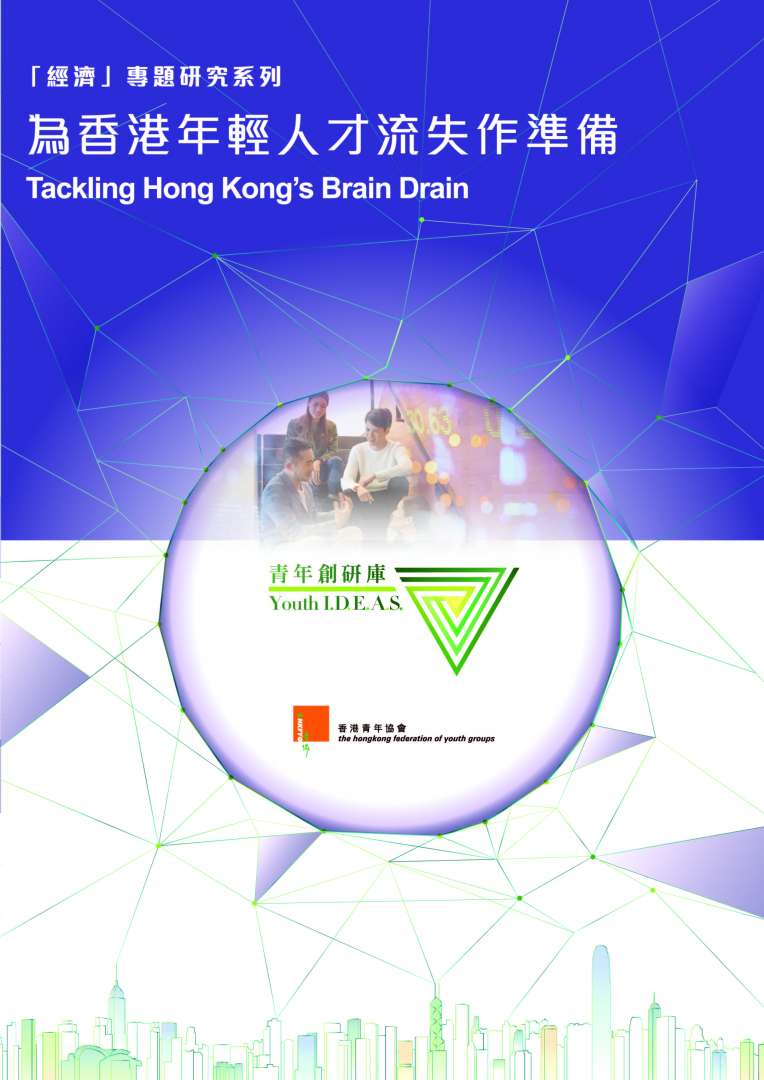Tackling Hong Kong’s Brain Drain
Youth I.D.E.A.S. 58
Economics
Tackling Hong Kong’s Brain Drain
14 March, 2021

A talent cluster is one of the key elements in promoting economic growth and social development. Human resources have been the most important asset of Hong Kong in this respect. According to the Report on Manpower Projection to 2027 released by the Labour and Welfare Bureau, the labour force of Hong Kong continues to decline but the overall workforce demand continues to rise. The demand for workers with a bachelor’s degree or above will have increased by 310,000 by 2027, leading to a shortage of 34,600 skilled workers with university-level education.
Facing this problem regarding talent shortages, various places have adopted aggressive methods to attract and retain skilled workers. However, Hong Kong has insufficient measures in place to deal with the situation. Since 2019, it has been noted that some young people lack confidence in the future following social and political turmoil in Hong Kong; they therefore plan to leave Hong Kong and find employment elsewhere. Government figures show that the number of “certificates of no criminal conviction” issued in 2019 was 33,252, up more than 40% from 2017 and 2018. In 2020, though the flow of people around the world was limited by the pandemic, this figure still reached 13,642 in the first half of the year,[1] indicating that the number of those who plan to emigrate or study abroad is still rising. This recent trend of emigration could negatively affect the development of Hong Kong’s economy.
“Brain circulation” has become a new normal in globalisation. According to discussions[2] by UNESCO on skilled migration and “brain drain”, the phenomenon of skilled professionals moving from developing countries to developed countries was first understood as negative and damaging to the former. Since then, the perspective has become more positive, as these individuals could return with experience and contribute to the education and training of the developing sending countries. The strategy for dealing with brain drain has thus shifted from preventing “brain outflow” to attracting “brain return”, as well as making use of diasporas to contribute to the sending countries. Therefore, the key is how positive brain circulation could be promoted.
However, Hong Kong has never had an aggressive policy through which to retain its brains, attract brain return, or make use of overseas Hong Kong human resources. In view of the growing phenomenon of youth brain drain, it is worth exploring strategies that the Hong Kong SAR government and enterprises should adopt to prepare for such an eventuality.
Through an online survey and in-depth interviews with individuals, this study seeks to understand the considerations of young people in choosing to develop their careers outside of Hong Kong, as well as their views on returning to Hong Kong and on remote employment. It further aims to explore solutions to retaining local young skilled workers, attracting the return of skilled workers from overseas, and making use of diasporas of human resources through expert interviews. By synthesising these analyses and findings, it is hoped that feasible recommendations can be made to tackle the brain drain issue.
This study uses data collected through three methods during the period from January to February 2021: an online survey of 1,135 under-35s with an undergraduate degree or higher qualification, case interviews with 20 young people working outside Hong Kong,[3] and interviews with four experts.
Discussion
- Hong Kong is expected to experience a shortage of skilled workers, given the increased demand of highly educated workers in the process of economic restructuring. The survey shows that a quarter of young skilled respondents plan to leave and work elsewhere. Nearly 30% of those who work in the four pillar industries or five high-potential industries agree. It is worrying that the brain drain brought about by the recent social and political unrest and individuals’ lack of confidence in the future could hinder Hong Kong’s economic development.
- In addition to the social and political factors involved, quality of life and personal development opportunities are other important factors to consider when Hong Kong young skilled workers choose their employment location. Interviewees generally think that career development opportunities in Hong Kong are unsatisfactory and the management cultures of enterprises are traditional, so innovative ideas are seldom adopted. These factors prompt them to leave and work elsewhere.
- Brain drain may bring about economic loss to the place of origin, but it may also create value. This is dependent upon how the government and enterprises convert brain drain into an economic driving force by attracting brain return, encouraging a two-way flow of brain power, and finding ways to make better use of diasporic youth.
- Young skilled workers who plan to leave and who are staying overseas value career development opportunities. They are willing to return to Hong Kong under certain circumstances. Some would consider long-distance employment or short-term employment in Hong Kong if the experience would be helpful for their future development. The impact of brain drain could be relieved if Hong Kong employers are more open to different modes of work and if they make good use of overseas Hong Kong’s human resources.
- To meet the needs of the employment market, respondents generally agree that Hong Kong should strengthen the training of current and second-tier skilled workers, in addition to attracting brain return and making better use of diasporic human resources. Besides, Hong Kong should attract overseas graduates to return to Hong Kong and attract diverse young talents from districts such as the mainland, Southeast Asia, and India to come to Hong Kong in order to fill the human resources gap.
Recommendations
- Enhance liaisons with and recruit Hong Kong young skilled workers overseas.
- Launch an “Internship Programme for Overseas Graduates” to encourage Hong Kong graduates to return and start their careers here.
- Provide housing allowances to high-quality young talents who return from overseas for a fixed duration so as to attract them to return to and work in Hong Kong.
- Expand the scope of the “Technology Voucher Programme” to include the cost of developing company internal workflow management systems.
- The Education Bureau should provide subsidies for second-tier skilled workers of designated industries to pursue part-time top-up degrees.
- Local companies are advised to update their management cultures and improve employees’ flexible work arrangements.
[1] HK01. (6 July 2020). “Number of certificates of no criminal conviction issued by police increased. Immigration experts: It’s self-evident”. Retrieved 7 December 2020 from https://www.hk01.com/社會新聞/494269/港版國安法-警簽發-良民證-數字回升-移民專家-不言而喻,2020年12月7日下載。
[2] Freitas, A., Vevatino, A., & Pecoud, A. (2012). Introduction: New perspectives on skilled migration. Diversities, 14(1), 1-7.
[3] Please refer to Section 2 of this report for the requirements of the interviewees and the definition of “work outside Hong Kong”.




